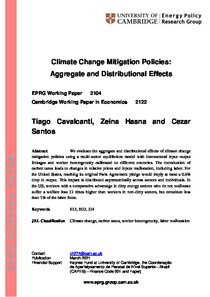Climate change mitigation policies: aggregate and distributional effects

Cavalcanti, Tiago ; Hasna, Zeina ; Santos, Cezar
2021
25 p.
environmental policy ; climate change ; labour market ; taxation ; economic impact ; labour supply
Brazil ; Canada ; China ; India ; Mexico ; USA
EPRG Working Paper
2104
Environment
https://www.eprg.group.cam.ac.uk/wp-content/uploads/2021/03/2104-Text.pdf
English
Bibliogr.
"We evaluate the aggregate and distributional effects of climate change mitigation policies using a multi-sector equilibrium model with intersectoral input–output linkages and worker heterogeneity calibrated to different countries. The introduction of carbon taxes leads to changes in relative prices and inputs reallocation, including labor. For the United States, reaching its original Paris Agreement pledge would imply at most a 0.6% drop in output. This impact is distributed asymmetrically across sectors and individuals. In the US, workers with a comparative advantage in dirty energy sectors who do not reallocate suffer a welfare loss 12 times higher than workers in non-dirty sectors, but constitute less than 1% of the labor force."
Digital
The ETUI is co-funded by the European Union. Views and opinions expressed are however those of the author(s) only and do not necessarily reflect those of the European Union or the ETUI.